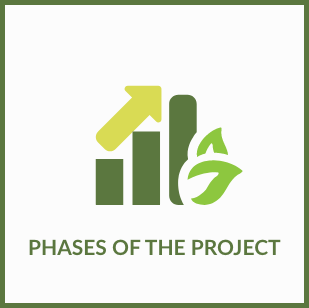
„EDINA – Energy-efficient development of special revitalisation zones and urban areas”.
Energy-efficient development of special revitalisation zones and urban areas (EDINA 2020-2022)
Institute of Urban and Regional Development together with two partners: Energy Conservation Foundation (FPE) and Housing Initiative for Eastern Europe (IWO e.V.) is working on a project called “Energy-efficient development of special revitalisation zones and urban areas (EDINA)”.
‘This project is part of the European Climate Initiative (EUKI) ). EUKI is a project financing instrument by the German Federal Ministry for Economic Affairs and Climate Action (BMWK)’.
The main objective of the EDINA project is to prepare a toolkit for measures and ways to improve energy efficiency in municipalities implementing revitalisation programmes, including the areas with difficult ownership relations or spatial conditions.
Establishing expertise and building capacities for improving energy efficiency in private facilities through refurbishment actions will contribute to environmental improvement.
EDINA shall increase the usability of old buildings – including those with undefined legal status. Building knowledge and capacities for assessing energy efficiency indicators for example thanks to energy efficiency calculator , which will be created on the basis of the Wałbrzych calculator, raises awareness of the environmental impact benefit of renovation projects.
Finally, energy efficiency standards and toolkit will be placed at the National Centre for Knowledge on Revitalisation, and distribution of the final materials to the Ministry of Development Funds and Regional Policy, the Ministry of Climate, and the Association of Polish Cities for supporting urban regeneration activities.
Training programmes and materials will be adapted to address international public with a special focus on their dissemination and multiplication in Lithuania, Latvia, and Hungary.
In a long term, EDINA aims to contribute to reducing CO2 emissions in Poland through increasing energy efficiency in private buildings in the country. The key element of the EDINA strategy is to promote energy efficiency standards and introducing them to revitalisation programmes in Poland. The effectiveness of these standards will be enhanced by raising awareness of the possible use of special legal instruments and public subsidies for improving energy efficiency in buildings situated in the Special Revitalisation Zones, which are the most neglected parts of the revitalisation areas in Poland.
Focusing on the building energy efficient refurbishment further corresponds with strategies formulated in the Energy Policy of Poland until 2040 (EPP2040) and the National Action Plan for Energy and Climate for the Years 2021-2030 .
Information about the project was also put on the European Climate Initiative (EUKI) website. Please follow the link
PROJECT OBJECTIVES
The main objectives
The main objective of the EDINA project is to work out a toolkit for measures and ways to improve energy efficiency in municipalities implementing revitalisation programmes, including the areas with difficult ownership relations or spatial conditions. By developing standardised methods and tools, the project will provide guidelines and trainings for at least 120 municipality practitioners in charge of implementing revitalisation programmes. Energy efficiency standards will be widely popularised as an integral part of urban regeneration activities among all 1,500 municipalities implementing revitalisation programmes. This approach will ensure that Polish municipalities will increase the rate of energy-efficient refurbishment in the building stock and reduce CO2 emissions.
Finally, energy efficiency standards and the toolkit will be put at the website of the National Centre for Knowledge on Revitalisation, the final materials will be passed to the Ministry of Development Funds and Regional Policy, Ministry of Climate, and the Association of Polish Cities for supporting urban regeneration activities.
The main objectives of the project (summary).
- Work out a toolkit and energy efficiency calculator for measures and ways to improve energy efficiency in municipalities implementing revitalisation programmes, usually in Special Revitalisation Zones.
- Provide guidelines and trainings for at least 120 municipality practitioners in charge of implementing revitalisation programmes.
- Increase awareness among municipalities in order to add additional legal requirements into existing instruments in Special Revitalisation Zones to improve energy-efficient capacity.
- Popularise energy efficiency standards as an integral part of urban regeneration activities among all 1,500 municipalities implementing revitalisation programmes in Poland.
- Increase the beneficiaries’ competence in the use of appropriate tools to improve the energy efficiency in community and private buildings.
- Promote energy efficiency standards and include them into revitalisation programmes in Poland.
- Disseminate EDINA project results (toolkit, manuals, energy efficiency calculator) abroad (Lithuania, Latvia and Hungary).
- Increase the rate of energy-efficient refurbishment in the building stock and reduce CO2 emissions.
Long-term objectives
In a long term, EDINA aims to contribute to reducing CO2 emissions in Poland through increasing energy efficiency in community and private buildings in Poland. The key element of the EDINA strategy is to promote energy efficiency standards and include them in revitalisation programmes in Poland. The effectiveness of these standards will be enhanced by raising awareness of the possible uses of special legal instruments and public subsidies for improving building energy efficiency in the Special Revitalisation Zones, which are the most neglected parts of the revitalisation areas in Poland. Focusing on the building energy efficient refurbishment further corresponds with strategies formulated in the Energy Policy of Poland until 2040 (EPP2040) and the National Action Plan for Energy and Climate for the Years 2021-2030 .
COMMUNICATION FROM THE COMMISSION TO THE EUROPEAN
PARLIAMENT, THE COUNCIL, THE EUROPEAN ECONOMIC AND SOCIAL
COMMITTEE AND THE COMMITTEE OF THE REGIONS
A Renovation Wave for Europe – greening our buildings, creating jobs, improving lives. https://ec.europa.eu/energy/topics/energy-efficiency/energy-efficient-buildings/renovation-wave_en#documents
Strategy to trigger a Renovation Wave for Europe, breaking down long-standing barriers to energy and resource-efficient renovation, supporting fresh investment over a sustained period starting from public and less efficient buildings, spurring digitalisation and creating employment and growth opportunities across the renovation supply chain.
The objective is to at least double the annual energy renovation rate of residential and non-residential buildings by 2030 and to foster deep energy renovations. Mobilising forces at all levels towards these goals will result in 35 million building units renovated by 2030. The increased rate and depth of renovation will have to be maintained also post-2030 in order to reach EU-wide climate neutrality by 2050.
PROJECT PARTICIPANTS

Target group A
The first group (A) consists of the representatives of nine municipalities: Łódź, Bytom, Płock, Opole Lubelskie, Polkowice, Kalisz, Włocławek, Świnoujście, Ośno Lubuskie (experts and practitioners). Those experts and practitioners are directly involved in implementing revitalisation programmes in their municipalities. The „expert group” will be engaged in co-creation activities for developing guidelines on how to use the instruments of Special Revitalisation Zones to improve energy efficiency in renovated community and private buildings. These guidelines will be disseminated among the stakeholders in 1,500 municipalities in Poland.

Target group B
The “stakeholders’ group” (B) includes municipality officials, residents of the revitalization area, property owners, real estate management entities (including housing cooperatives, housing communities, social housing associations) and non-governmental organisations. This group includes representatives of 1,500 municipalities where revitalisation programmes are implemented.
MAIN OUTPUTS OF THE PROJECT

Contact us
![]() Phone: +48 22 6191350
Phone: +48 22 6191350 Email: edina@irmir.pl
Email: edina@irmir.pl Working hours : pn-pt 8:00-16:00
Working hours : pn-pt 8:00-16:00 Adress: Ul. Targowa 45 03-728 Warszawa
Adress: Ul. Targowa 45 03-728 Warszawa



